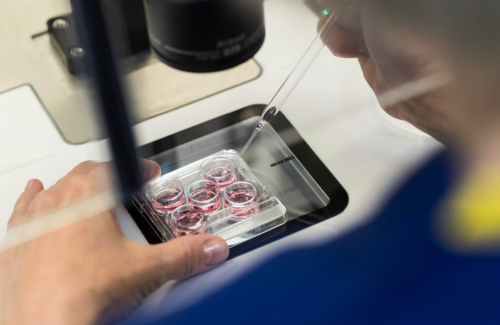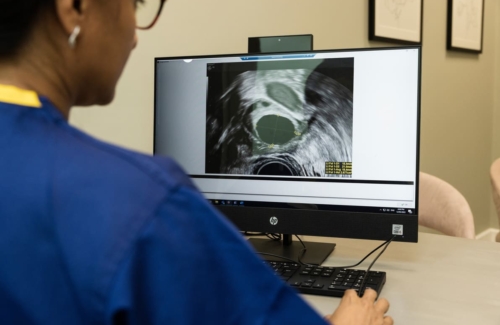Female infertility Female infertility: putting you back in control
Infertility affects around 1 in 7 couples who are trying to get pregnant.
We understand how difficult it can be dealing with infertility. We’re ready to help support you throughout your journey.
Causes of female infertility
The reproductive system is very complex, and it takes only one small thing in a process of hundreds to make it difficult to conceive.
There are a number of causes of infertility in women, either:
- Problems with ovulation
- Age
- Scarring from previous surgery
- Cervical mucus problems
- Fibroids
- Endometriosis
- Side effects of medicines or drugs, including non-steroidal anti-inflammatory drugs, chemotherapy, neuroleptic medicines or spironolactone
Ovulation problems can be caused by:
- Polycystic ovary syndrome (PCOS)
- Thyroid problems
- Premature ovarian failure – when the ovaries stop working before the age of 40
Signs of infertility in women
Many women have no infertility symptoms at all, and have no reason to suspect they are infertile until they start trying to get pregnant.
Aside from having trouble conceiving, infertility symptoms can vary significantly from one woman to another. The most common female infertility symptoms may include:
- Pain during sex
- Irregular menstrual cycle
- Dark or pale menstrual blood
- Painful and heavy periods
- Hormonal changes
- Underlying medical conditions such as endometriosis or PCOS
Diagnosing infertility in women
Understanding why you’re not conceiving is absolutely vital before we start any treatment, as there are a number of factors that can impact female fertility.
Depending on what stage of your journey you are on, you could either book in for an initial female fertility review, which is a good starting point for assessing fertility and identifying any future concerns.
The Female Fertility Review is a good starting point for assessing fertility and identifying any future concerns. It includes: a consultation, an ultrasound scan, an AMH (ovarian reserve) blood test and a TSH (thyroid function) blood test.
Or, if you are ready for a conversation about fertility treatment, you can book in for an Initial Consultation with one of our fertility consultants, where they will conduct blood tests and ultrasound scans – to monitor and diagnose any fertility issues – and discuss your situation and options, to maximise your chances of conceiving your own biological child.
Additional tests such as a hysteroscopy – an inspection of the womb and cervix to identify any uterine conditions – or a laparoscopy to check for any blockages and blood tests to check for hormone levels and whether you are ovulating, can be arranged at this consultation for an additional cost.
Treating female infertility
There are a number of ways to treat different female infertility conditions, and our combined focus and expertise in gynaecology and fertility sets us apart when considering what is right for you, maximising your chances of becoming pregnant.
The below treatment options can all be undertaken in our state-of-the-art facility.
- Laparoscopy – We are leading UK experts in laparoscopic surgeries
- Mymectomy – This procedure involves the surgical removal of fibroids
- IVF – Where eggs and sperm are introduced in culture and left to fertilise overnight
- ICSI – Where a single sperm is injected into a mature egg to fertilise
- Fertility Preservation – Gametes and embryos are stored for the future
- PGT-A – Embryos are tested for chromosomal abnormalities
- IUI – Sperm is transferred into the womb
- Ovulation Induction – Stimulating follicle growth for ovulation
How The Evewell can help you with female infertility
Here at The Evewell, we specialise in treating and diagnosing infertility and only conduct the necessary tests to understand our patients’ fertility issues.
Our combined focus on gynaecology and fertility means our experienced team can provide a holistic evaluation of your situation and create a personalised treatment plan to maximise your chances of conceiving, ensuring the least invasive route to pregnancy.
Your doctor may then recommend some tests, which may include blood tests, a pelvic examination and ultrasound scan. Based on all of this, we can then create an individualised treatment plan to maximise your chances of conceiving a baby, using the least invasive treatment for your situation.











